Positive Impact of Gardening on Mental Health: A Research Proposal
VerifiedAdded on 2022/12/27
|29
|6626
|1
Project
AI Summary
This research proposal investigates the positive impact of gardening on the mental health of older people in South Australia. The introduction highlights the potential of gardening to reduce mental health issues like depression, anxiety, and social isolation in the elderly. The proposal includes a comprehensive literature review that synthesizes existing research on the topic, examining methodologies, strengths, weaknesses, and gaps in current knowledge. The research design outlines the epistemology, theoretical perspective, research methodology, ethical considerations, data analysis methods, and dissemination strategies. The literature review covers various studies, including those by Hofmann et al. (2017), Peeters et al. (2014), and Soga, Gaston, & Yamaura (2017), which emphasize the benefits of gardening on stress reduction, physical activity, and overall well-being. The proposal also addresses the importance of community-based horticulture programs, as highlighted by Chan et al. (2017), and the potential of horticultural therapy to reduce stress and improve mental health outcomes, as discussed by Han, Park & Ahn (2018). The proposal aims to contribute to the existing body of knowledge by focusing on the specific context of South Australia and addressing the identified gaps in the literature regarding the mental health benefits of gardening for older adults.
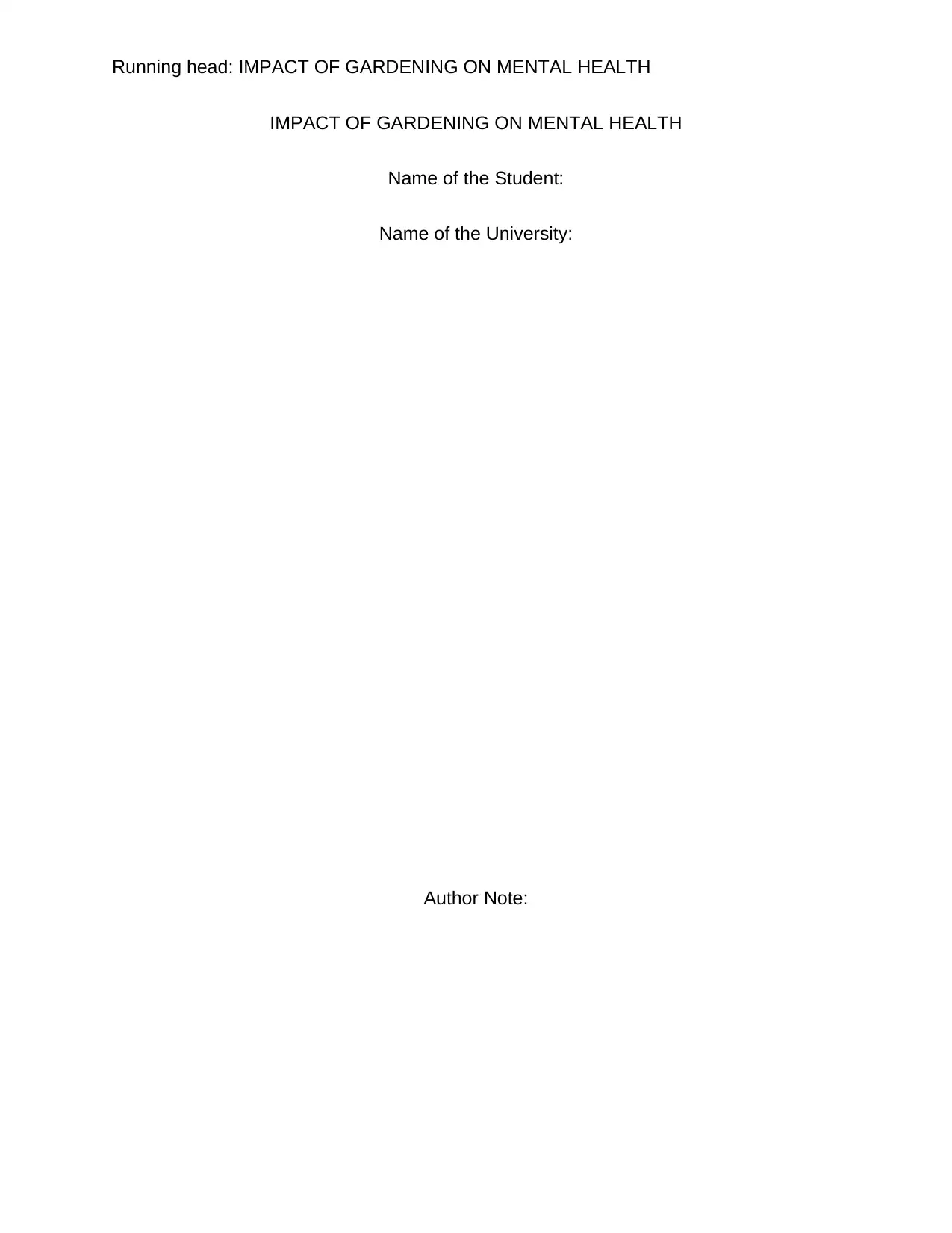
Running head: IMPACT OF GARDENING ON MENTAL HEALTH
IMPACT OF GARDENING ON MENTAL HEALTH
Name of the Student:
Name of the University:
Author Note:
IMPACT OF GARDENING ON MENTAL HEALTH
Name of the Student:
Name of the University:
Author Note:
Paraphrase This Document
Need a fresh take? Get an instant paraphrase of this document with our AI Paraphraser

1IMPACT OF GARDENING ON MENTAL HEALTH
Title of the Research Proposal: Positive Impact of gardening on the mental health of
older people in South Australia.
Title of the Research Proposal: Positive Impact of gardening on the mental health of
older people in South Australia.
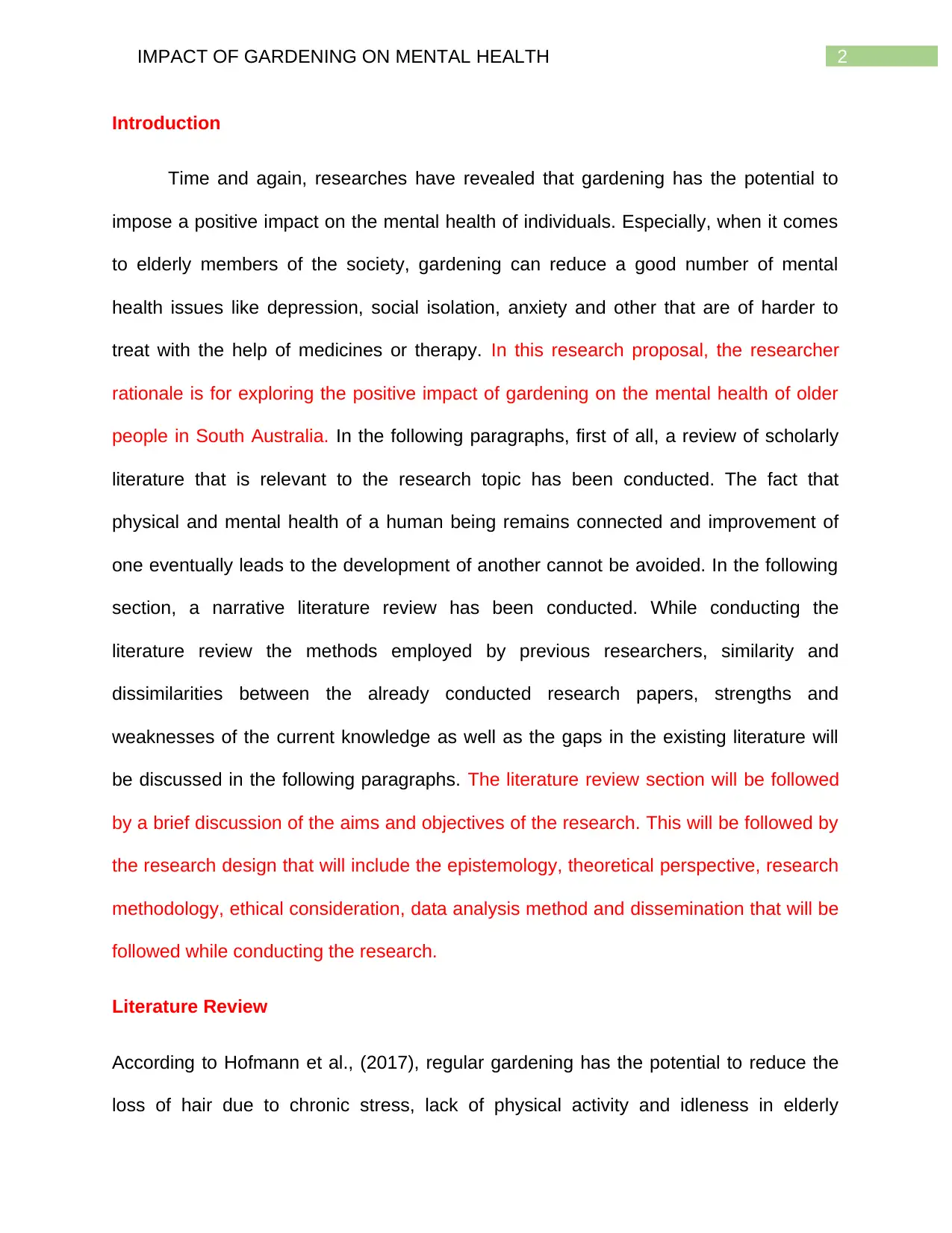
2IMPACT OF GARDENING ON MENTAL HEALTH
Introduction
Time and again, researches have revealed that gardening has the potential to
impose a positive impact on the mental health of individuals. Especially, when it comes
to elderly members of the society, gardening can reduce a good number of mental
health issues like depression, social isolation, anxiety and other that are of harder to
treat with the help of medicines or therapy. In this research proposal, the researcher
rationale is for exploring the positive impact of gardening on the mental health of older
people in South Australia. In the following paragraphs, first of all, a review of scholarly
literature that is relevant to the research topic has been conducted. The fact that
physical and mental health of a human being remains connected and improvement of
one eventually leads to the development of another cannot be avoided. In the following
section, a narrative literature review has been conducted. While conducting the
literature review the methods employed by previous researchers, similarity and
dissimilarities between the already conducted research papers, strengths and
weaknesses of the current knowledge as well as the gaps in the existing literature will
be discussed in the following paragraphs. The literature review section will be followed
by a brief discussion of the aims and objectives of the research. This will be followed by
the research design that will include the epistemology, theoretical perspective, research
methodology, ethical consideration, data analysis method and dissemination that will be
followed while conducting the research.
Literature Review
According to Hofmann et al., (2017), regular gardening has the potential to reduce the
loss of hair due to chronic stress, lack of physical activity and idleness in elderly
Introduction
Time and again, researches have revealed that gardening has the potential to
impose a positive impact on the mental health of individuals. Especially, when it comes
to elderly members of the society, gardening can reduce a good number of mental
health issues like depression, social isolation, anxiety and other that are of harder to
treat with the help of medicines or therapy. In this research proposal, the researcher
rationale is for exploring the positive impact of gardening on the mental health of older
people in South Australia. In the following paragraphs, first of all, a review of scholarly
literature that is relevant to the research topic has been conducted. The fact that
physical and mental health of a human being remains connected and improvement of
one eventually leads to the development of another cannot be avoided. In the following
section, a narrative literature review has been conducted. While conducting the
literature review the methods employed by previous researchers, similarity and
dissimilarities between the already conducted research papers, strengths and
weaknesses of the current knowledge as well as the gaps in the existing literature will
be discussed in the following paragraphs. The literature review section will be followed
by a brief discussion of the aims and objectives of the research. This will be followed by
the research design that will include the epistemology, theoretical perspective, research
methodology, ethical consideration, data analysis method and dissemination that will be
followed while conducting the research.
Literature Review
According to Hofmann et al., (2017), regular gardening has the potential to reduce the
loss of hair due to chronic stress, lack of physical activity and idleness in elderly
⊘ This is a preview!⊘
Do you want full access?
Subscribe today to unlock all pages.

Trusted by 1+ million students worldwide
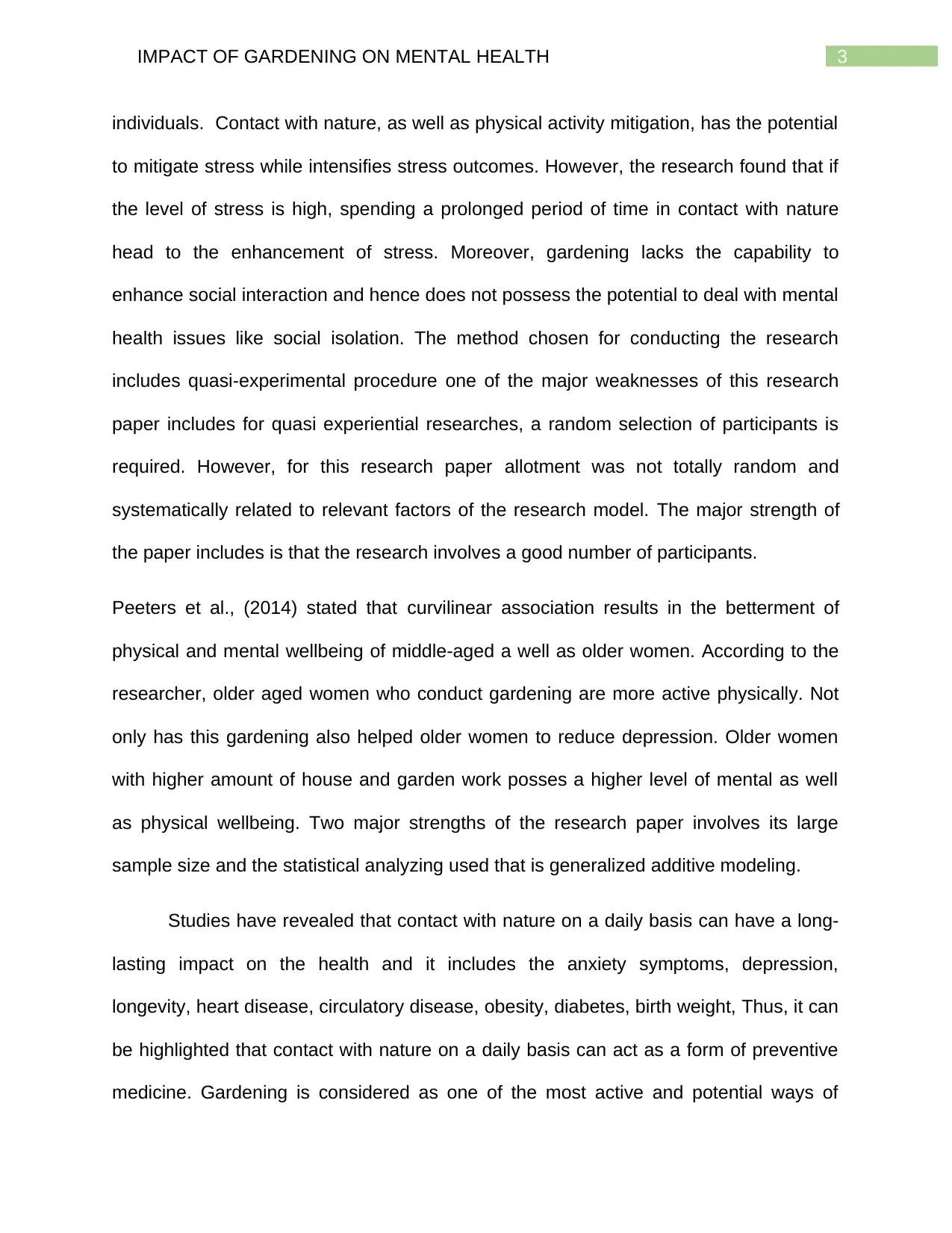
3IMPACT OF GARDENING ON MENTAL HEALTH
individuals. Contact with nature, as well as physical activity mitigation, has the potential
to mitigate stress while intensifies stress outcomes. However, the research found that if
the level of stress is high, spending a prolonged period of time in contact with nature
head to the enhancement of stress. Moreover, gardening lacks the capability to
enhance social interaction and hence does not possess the potential to deal with mental
health issues like social isolation. The method chosen for conducting the research
includes quasi-experimental procedure one of the major weaknesses of this research
paper includes for quasi experiential researches, a random selection of participants is
required. However, for this research paper allotment was not totally random and
systematically related to relevant factors of the research model. The major strength of
the paper includes is that the research involves a good number of participants.
Peeters et al., (2014) stated that curvilinear association results in the betterment of
physical and mental wellbeing of middle-aged a well as older women. According to the
researcher, older aged women who conduct gardening are more active physically. Not
only has this gardening also helped older women to reduce depression. Older women
with higher amount of house and garden work posses a higher level of mental as well
as physical wellbeing. Two major strengths of the research paper involves its large
sample size and the statistical analyzing used that is generalized additive modeling.
Studies have revealed that contact with nature on a daily basis can have a long-
lasting impact on the health and it includes the anxiety symptoms, depression,
longevity, heart disease, circulatory disease, obesity, diabetes, birth weight, Thus, it can
be highlighted that contact with nature on a daily basis can act as a form of preventive
medicine. Gardening is considered as one of the most active and potential ways of
individuals. Contact with nature, as well as physical activity mitigation, has the potential
to mitigate stress while intensifies stress outcomes. However, the research found that if
the level of stress is high, spending a prolonged period of time in contact with nature
head to the enhancement of stress. Moreover, gardening lacks the capability to
enhance social interaction and hence does not possess the potential to deal with mental
health issues like social isolation. The method chosen for conducting the research
includes quasi-experimental procedure one of the major weaknesses of this research
paper includes for quasi experiential researches, a random selection of participants is
required. However, for this research paper allotment was not totally random and
systematically related to relevant factors of the research model. The major strength of
the paper includes is that the research involves a good number of participants.
Peeters et al., (2014) stated that curvilinear association results in the betterment of
physical and mental wellbeing of middle-aged a well as older women. According to the
researcher, older aged women who conduct gardening are more active physically. Not
only has this gardening also helped older women to reduce depression. Older women
with higher amount of house and garden work posses a higher level of mental as well
as physical wellbeing. Two major strengths of the research paper involves its large
sample size and the statistical analyzing used that is generalized additive modeling.
Studies have revealed that contact with nature on a daily basis can have a long-
lasting impact on the health and it includes the anxiety symptoms, depression,
longevity, heart disease, circulatory disease, obesity, diabetes, birth weight, Thus, it can
be highlighted that contact with nature on a daily basis can act as a form of preventive
medicine. Gardening is considered as one of the most active and potential ways of
Paraphrase This Document
Need a fresh take? Get an instant paraphrase of this document with our AI Paraphraser
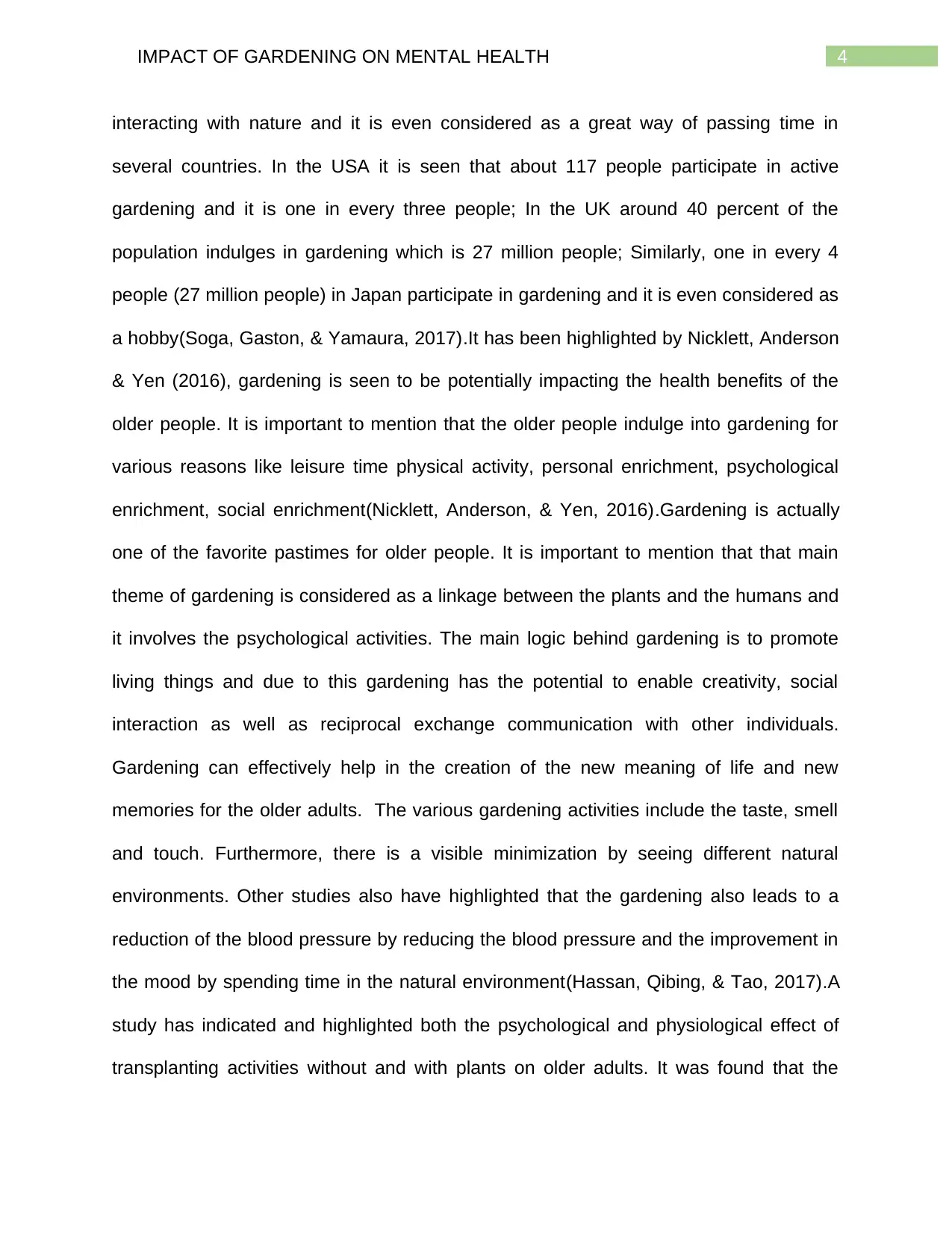
4IMPACT OF GARDENING ON MENTAL HEALTH
interacting with nature and it is even considered as a great way of passing time in
several countries. In the USA it is seen that about 117 people participate in active
gardening and it is one in every three people; In the UK around 40 percent of the
population indulges in gardening which is 27 million people; Similarly, one in every 4
people (27 million people) in Japan participate in gardening and it is even considered as
a hobby(Soga, Gaston, & Yamaura, 2017).It has been highlighted by Nicklett, Anderson
& Yen (2016), gardening is seen to be potentially impacting the health benefits of the
older people. It is important to mention that the older people indulge into gardening for
various reasons like leisure time physical activity, personal enrichment, psychological
enrichment, social enrichment(Nicklett, Anderson, & Yen, 2016).Gardening is actually
one of the favorite pastimes for older people. It is important to mention that that main
theme of gardening is considered as a linkage between the plants and the humans and
it involves the psychological activities. The main logic behind gardening is to promote
living things and due to this gardening has the potential to enable creativity, social
interaction as well as reciprocal exchange communication with other individuals.
Gardening can effectively help in the creation of the new meaning of life and new
memories for the older adults. The various gardening activities include the taste, smell
and touch. Furthermore, there is a visible minimization by seeing different natural
environments. Other studies also have highlighted that the gardening also leads to a
reduction of the blood pressure by reducing the blood pressure and the improvement in
the mood by spending time in the natural environment(Hassan, Qibing, & Tao, 2017).A
study has indicated and highlighted both the psychological and physiological effect of
transplanting activities without and with plants on older adults. It was found that the
interacting with nature and it is even considered as a great way of passing time in
several countries. In the USA it is seen that about 117 people participate in active
gardening and it is one in every three people; In the UK around 40 percent of the
population indulges in gardening which is 27 million people; Similarly, one in every 4
people (27 million people) in Japan participate in gardening and it is even considered as
a hobby(Soga, Gaston, & Yamaura, 2017).It has been highlighted by Nicklett, Anderson
& Yen (2016), gardening is seen to be potentially impacting the health benefits of the
older people. It is important to mention that the older people indulge into gardening for
various reasons like leisure time physical activity, personal enrichment, psychological
enrichment, social enrichment(Nicklett, Anderson, & Yen, 2016).Gardening is actually
one of the favorite pastimes for older people. It is important to mention that that main
theme of gardening is considered as a linkage between the plants and the humans and
it involves the psychological activities. The main logic behind gardening is to promote
living things and due to this gardening has the potential to enable creativity, social
interaction as well as reciprocal exchange communication with other individuals.
Gardening can effectively help in the creation of the new meaning of life and new
memories for the older adults. The various gardening activities include the taste, smell
and touch. Furthermore, there is a visible minimization by seeing different natural
environments. Other studies also have highlighted that the gardening also leads to a
reduction of the blood pressure by reducing the blood pressure and the improvement in
the mood by spending time in the natural environment(Hassan, Qibing, & Tao, 2017).A
study has indicated and highlighted both the psychological and physiological effect of
transplanting activities without and with plants on older adults. It was found that the
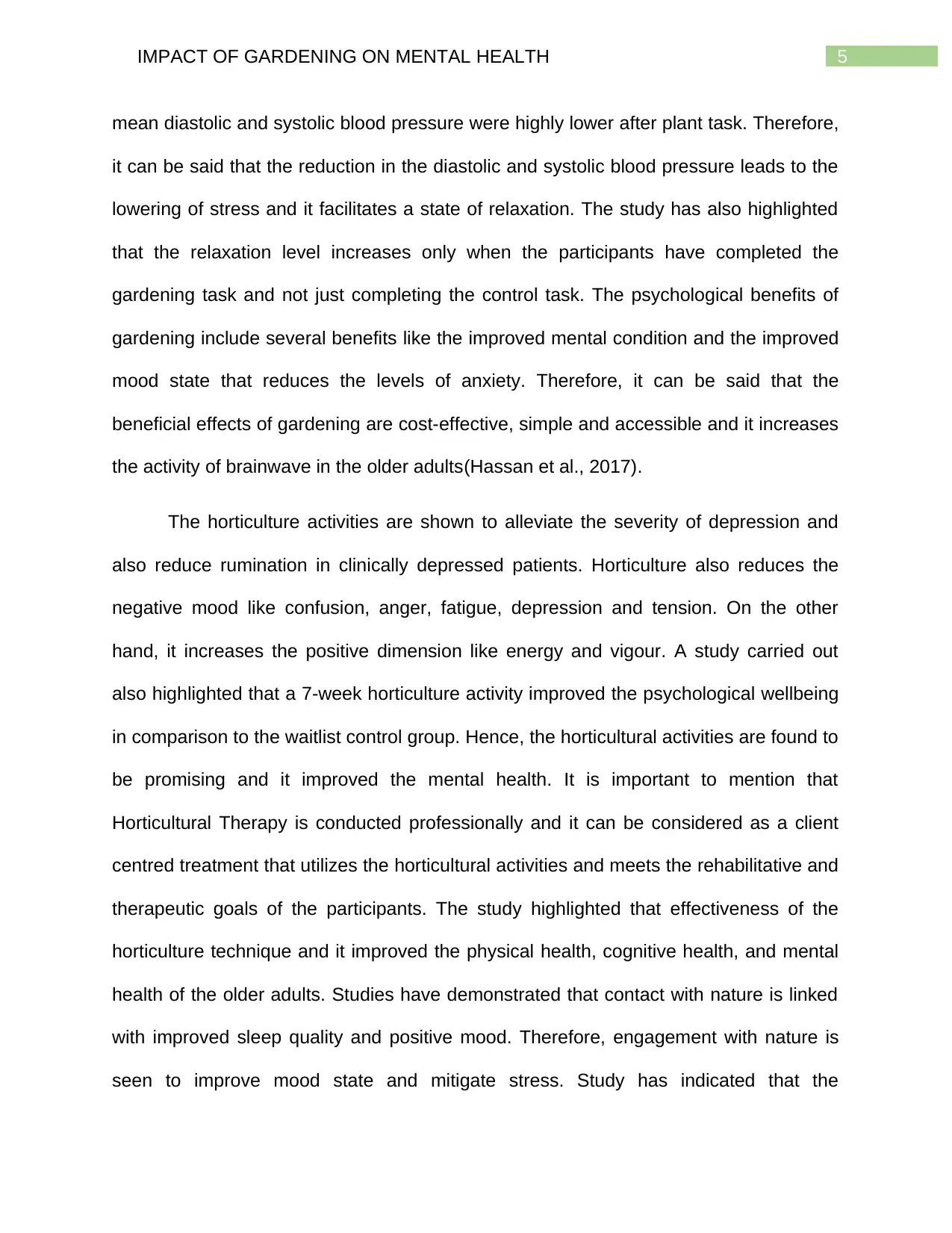
5IMPACT OF GARDENING ON MENTAL HEALTH
mean diastolic and systolic blood pressure were highly lower after plant task. Therefore,
it can be said that the reduction in the diastolic and systolic blood pressure leads to the
lowering of stress and it facilitates a state of relaxation. The study has also highlighted
that the relaxation level increases only when the participants have completed the
gardening task and not just completing the control task. The psychological benefits of
gardening include several benefits like the improved mental condition and the improved
mood state that reduces the levels of anxiety. Therefore, it can be said that the
beneficial effects of gardening are cost-effective, simple and accessible and it increases
the activity of brainwave in the older adults(Hassan et al., 2017).
The horticulture activities are shown to alleviate the severity of depression and
also reduce rumination in clinically depressed patients. Horticulture also reduces the
negative mood like confusion, anger, fatigue, depression and tension. On the other
hand, it increases the positive dimension like energy and vigour. A study carried out
also highlighted that a 7-week horticulture activity improved the psychological wellbeing
in comparison to the waitlist control group. Hence, the horticultural activities are found to
be promising and it improved the mental health. It is important to mention that
Horticultural Therapy is conducted professionally and it can be considered as a client
centred treatment that utilizes the horticultural activities and meets the rehabilitative and
therapeutic goals of the participants. The study highlighted that effectiveness of the
horticulture technique and it improved the physical health, cognitive health, and mental
health of the older adults. Studies have demonstrated that contact with nature is linked
with improved sleep quality and positive mood. Therefore, engagement with nature is
seen to improve mood state and mitigate stress. Study has indicated that the
mean diastolic and systolic blood pressure were highly lower after plant task. Therefore,
it can be said that the reduction in the diastolic and systolic blood pressure leads to the
lowering of stress and it facilitates a state of relaxation. The study has also highlighted
that the relaxation level increases only when the participants have completed the
gardening task and not just completing the control task. The psychological benefits of
gardening include several benefits like the improved mental condition and the improved
mood state that reduces the levels of anxiety. Therefore, it can be said that the
beneficial effects of gardening are cost-effective, simple and accessible and it increases
the activity of brainwave in the older adults(Hassan et al., 2017).
The horticulture activities are shown to alleviate the severity of depression and
also reduce rumination in clinically depressed patients. Horticulture also reduces the
negative mood like confusion, anger, fatigue, depression and tension. On the other
hand, it increases the positive dimension like energy and vigour. A study carried out
also highlighted that a 7-week horticulture activity improved the psychological wellbeing
in comparison to the waitlist control group. Hence, the horticultural activities are found to
be promising and it improved the mental health. It is important to mention that
Horticultural Therapy is conducted professionally and it can be considered as a client
centred treatment that utilizes the horticultural activities and meets the rehabilitative and
therapeutic goals of the participants. The study highlighted that effectiveness of the
horticulture technique and it improved the physical health, cognitive health, and mental
health of the older adults. Studies have demonstrated that contact with nature is linked
with improved sleep quality and positive mood. Therefore, engagement with nature is
seen to improve mood state and mitigate stress. Study has indicated that the
⊘ This is a preview!⊘
Do you want full access?
Subscribe today to unlock all pages.

Trusted by 1+ million students worldwide
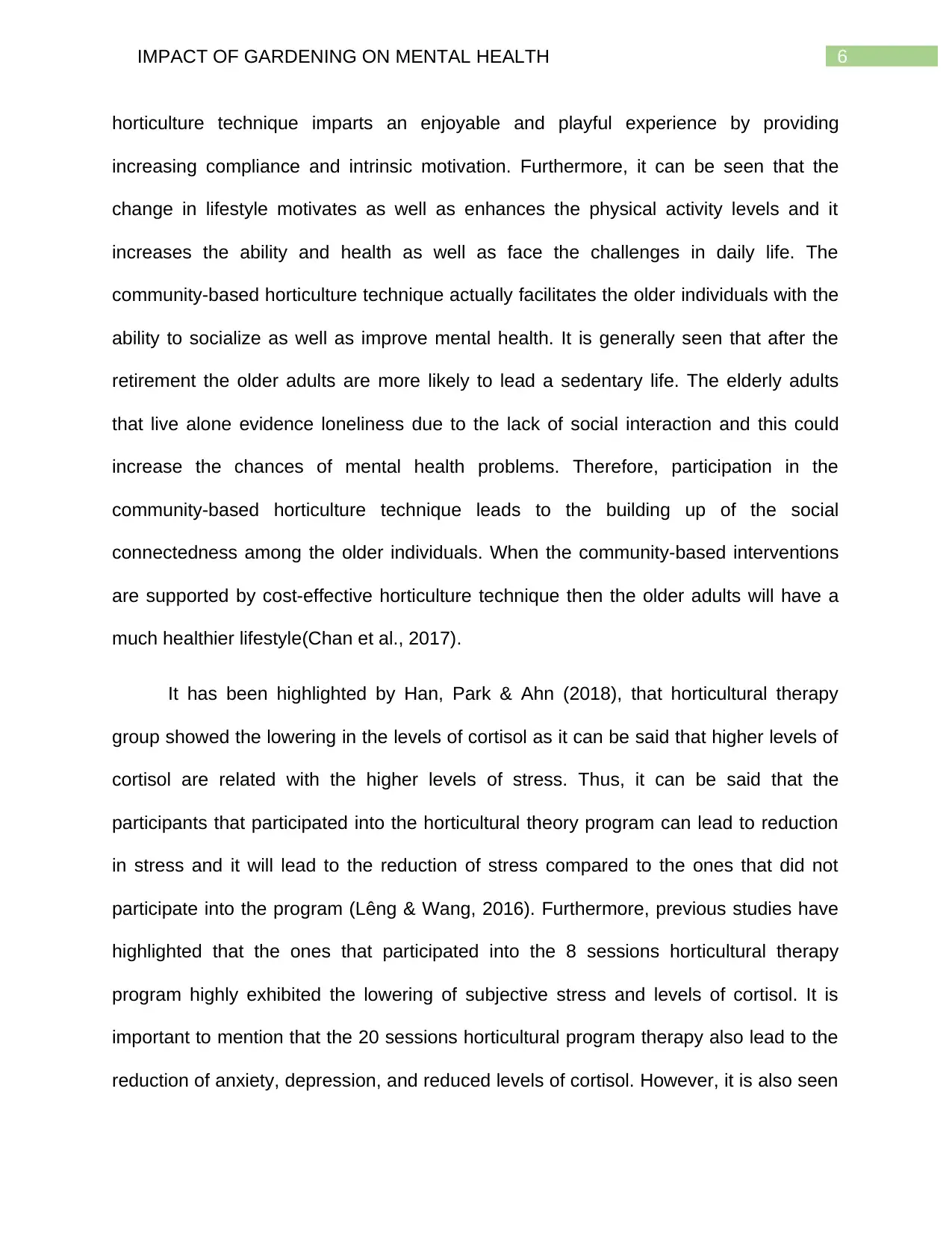
6IMPACT OF GARDENING ON MENTAL HEALTH
horticulture technique imparts an enjoyable and playful experience by providing
increasing compliance and intrinsic motivation. Furthermore, it can be seen that the
change in lifestyle motivates as well as enhances the physical activity levels and it
increases the ability and health as well as face the challenges in daily life. The
community-based horticulture technique actually facilitates the older individuals with the
ability to socialize as well as improve mental health. It is generally seen that after the
retirement the older adults are more likely to lead a sedentary life. The elderly adults
that live alone evidence loneliness due to the lack of social interaction and this could
increase the chances of mental health problems. Therefore, participation in the
community-based horticulture technique leads to the building up of the social
connectedness among the older individuals. When the community-based interventions
are supported by cost-effective horticulture technique then the older adults will have a
much healthier lifestyle(Chan et al., 2017).
It has been highlighted by Han, Park & Ahn (2018), that horticultural therapy
group showed the lowering in the levels of cortisol as it can be said that higher levels of
cortisol are related with the higher levels of stress. Thus, it can be said that the
participants that participated into the horticultural theory program can lead to reduction
in stress and it will lead to the reduction of stress compared to the ones that did not
participate into the program (Lêng & Wang, 2016). Furthermore, previous studies have
highlighted that the ones that participated into the 8 sessions horticultural therapy
program highly exhibited the lowering of subjective stress and levels of cortisol. It is
important to mention that the 20 sessions horticultural program therapy also lead to the
reduction of anxiety, depression, and reduced levels of cortisol. However, it is also seen
horticulture technique imparts an enjoyable and playful experience by providing
increasing compliance and intrinsic motivation. Furthermore, it can be seen that the
change in lifestyle motivates as well as enhances the physical activity levels and it
increases the ability and health as well as face the challenges in daily life. The
community-based horticulture technique actually facilitates the older individuals with the
ability to socialize as well as improve mental health. It is generally seen that after the
retirement the older adults are more likely to lead a sedentary life. The elderly adults
that live alone evidence loneliness due to the lack of social interaction and this could
increase the chances of mental health problems. Therefore, participation in the
community-based horticulture technique leads to the building up of the social
connectedness among the older individuals. When the community-based interventions
are supported by cost-effective horticulture technique then the older adults will have a
much healthier lifestyle(Chan et al., 2017).
It has been highlighted by Han, Park & Ahn (2018), that horticultural therapy
group showed the lowering in the levels of cortisol as it can be said that higher levels of
cortisol are related with the higher levels of stress. Thus, it can be said that the
participants that participated into the horticultural theory program can lead to reduction
in stress and it will lead to the reduction of stress compared to the ones that did not
participate into the program (Lêng & Wang, 2016). Furthermore, previous studies have
highlighted that the ones that participated into the 8 sessions horticultural therapy
program highly exhibited the lowering of subjective stress and levels of cortisol. It is
important to mention that the 20 sessions horticultural program therapy also lead to the
reduction of anxiety, depression, and reduced levels of cortisol. However, it is also seen
Paraphrase This Document
Need a fresh take? Get an instant paraphrase of this document with our AI Paraphraser
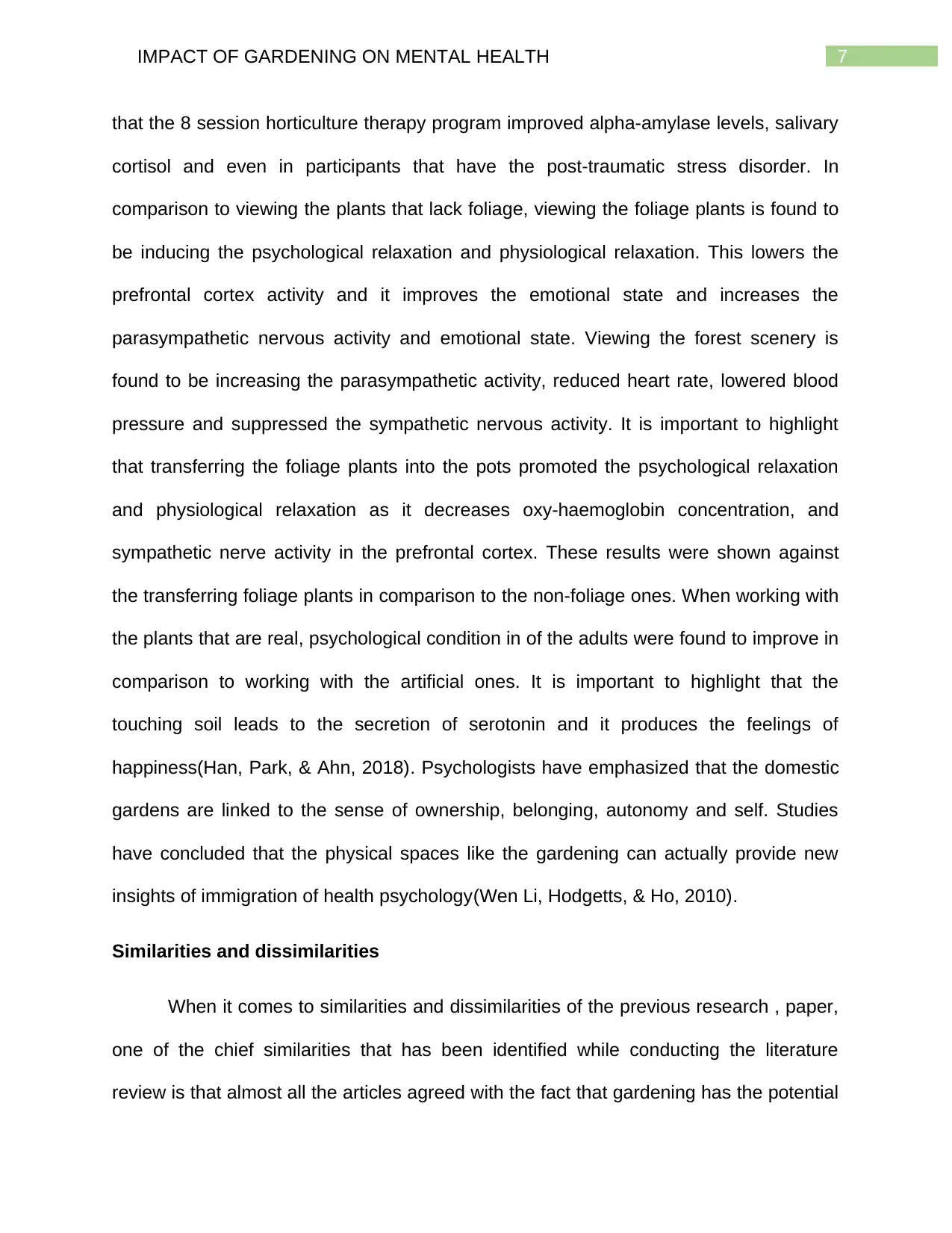
7IMPACT OF GARDENING ON MENTAL HEALTH
that the 8 session horticulture therapy program improved alpha-amylase levels, salivary
cortisol and even in participants that have the post-traumatic stress disorder. In
comparison to viewing the plants that lack foliage, viewing the foliage plants is found to
be inducing the psychological relaxation and physiological relaxation. This lowers the
prefrontal cortex activity and it improves the emotional state and increases the
parasympathetic nervous activity and emotional state. Viewing the forest scenery is
found to be increasing the parasympathetic activity, reduced heart rate, lowered blood
pressure and suppressed the sympathetic nervous activity. It is important to highlight
that transferring the foliage plants into the pots promoted the psychological relaxation
and physiological relaxation as it decreases oxy-haemoglobin concentration, and
sympathetic nerve activity in the prefrontal cortex. These results were shown against
the transferring foliage plants in comparison to the non-foliage ones. When working with
the plants that are real, psychological condition in of the adults were found to improve in
comparison to working with the artificial ones. It is important to highlight that the
touching soil leads to the secretion of serotonin and it produces the feelings of
happiness(Han, Park, & Ahn, 2018). Psychologists have emphasized that the domestic
gardens are linked to the sense of ownership, belonging, autonomy and self. Studies
have concluded that the physical spaces like the gardening can actually provide new
insights of immigration of health psychology(Wen Li, Hodgetts, & Ho, 2010).
Similarities and dissimilarities
When it comes to similarities and dissimilarities of the previous research , paper,
one of the chief similarities that has been identified while conducting the literature
review is that almost all the articles agreed with the fact that gardening has the potential
that the 8 session horticulture therapy program improved alpha-amylase levels, salivary
cortisol and even in participants that have the post-traumatic stress disorder. In
comparison to viewing the plants that lack foliage, viewing the foliage plants is found to
be inducing the psychological relaxation and physiological relaxation. This lowers the
prefrontal cortex activity and it improves the emotional state and increases the
parasympathetic nervous activity and emotional state. Viewing the forest scenery is
found to be increasing the parasympathetic activity, reduced heart rate, lowered blood
pressure and suppressed the sympathetic nervous activity. It is important to highlight
that transferring the foliage plants into the pots promoted the psychological relaxation
and physiological relaxation as it decreases oxy-haemoglobin concentration, and
sympathetic nerve activity in the prefrontal cortex. These results were shown against
the transferring foliage plants in comparison to the non-foliage ones. When working with
the plants that are real, psychological condition in of the adults were found to improve in
comparison to working with the artificial ones. It is important to highlight that the
touching soil leads to the secretion of serotonin and it produces the feelings of
happiness(Han, Park, & Ahn, 2018). Psychologists have emphasized that the domestic
gardens are linked to the sense of ownership, belonging, autonomy and self. Studies
have concluded that the physical spaces like the gardening can actually provide new
insights of immigration of health psychology(Wen Li, Hodgetts, & Ho, 2010).
Similarities and dissimilarities
When it comes to similarities and dissimilarities of the previous research , paper,
one of the chief similarities that has been identified while conducting the literature
review is that almost all the articles agreed with the fact that gardening has the potential
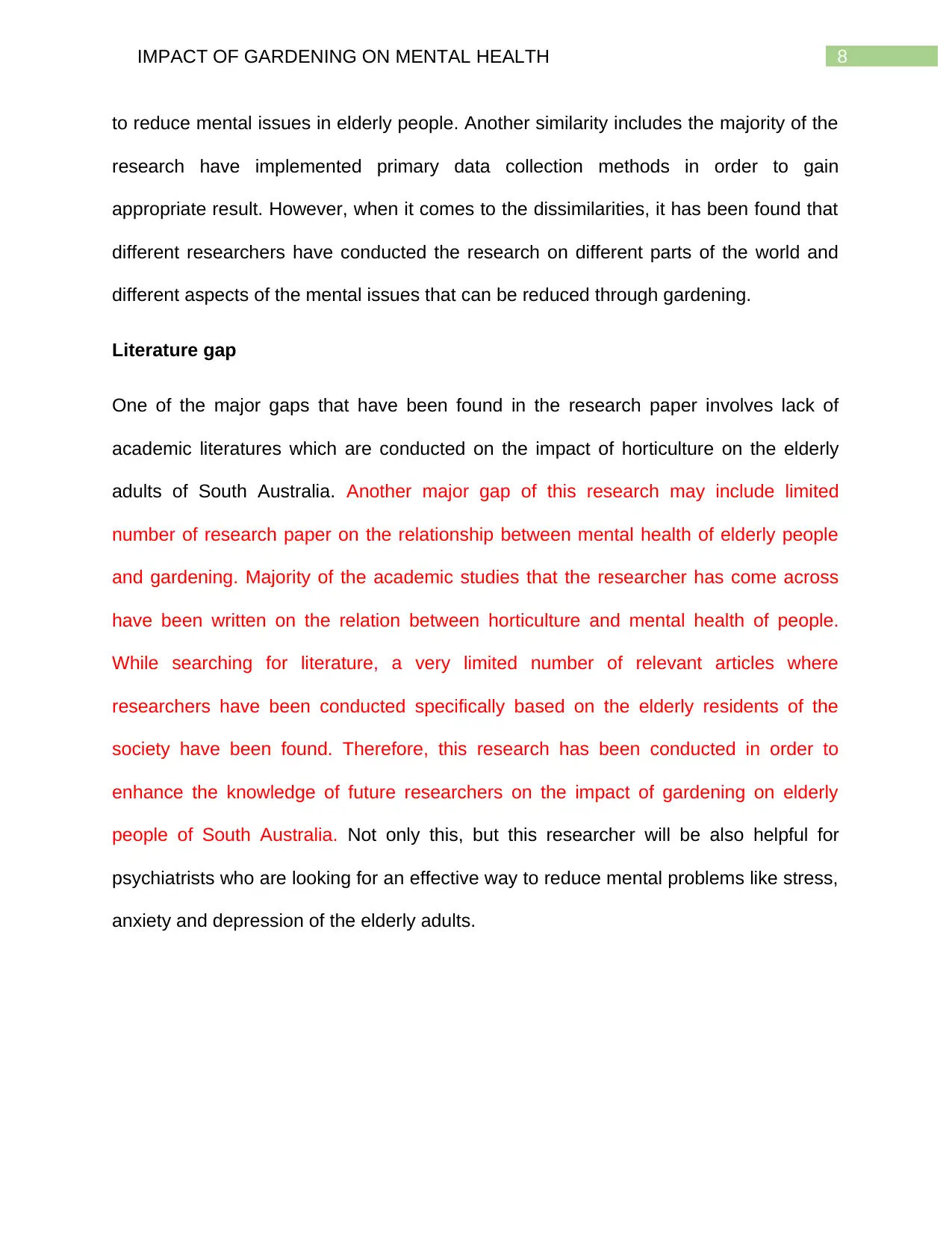
8IMPACT OF GARDENING ON MENTAL HEALTH
to reduce mental issues in elderly people. Another similarity includes the majority of the
research have implemented primary data collection methods in order to gain
appropriate result. However, when it comes to the dissimilarities, it has been found that
different researchers have conducted the research on different parts of the world and
different aspects of the mental issues that can be reduced through gardening.
Literature gap
One of the major gaps that have been found in the research paper involves lack of
academic literatures which are conducted on the impact of horticulture on the elderly
adults of South Australia. Another major gap of this research may include limited
number of research paper on the relationship between mental health of elderly people
and gardening. Majority of the academic studies that the researcher has come across
have been written on the relation between horticulture and mental health of people.
While searching for literature, a very limited number of relevant articles where
researchers have been conducted specifically based on the elderly residents of the
society have been found. Therefore, this research has been conducted in order to
enhance the knowledge of future researchers on the impact of gardening on elderly
people of South Australia. Not only this, but this researcher will be also helpful for
psychiatrists who are looking for an effective way to reduce mental problems like stress,
anxiety and depression of the elderly adults.
to reduce mental issues in elderly people. Another similarity includes the majority of the
research have implemented primary data collection methods in order to gain
appropriate result. However, when it comes to the dissimilarities, it has been found that
different researchers have conducted the research on different parts of the world and
different aspects of the mental issues that can be reduced through gardening.
Literature gap
One of the major gaps that have been found in the research paper involves lack of
academic literatures which are conducted on the impact of horticulture on the elderly
adults of South Australia. Another major gap of this research may include limited
number of research paper on the relationship between mental health of elderly people
and gardening. Majority of the academic studies that the researcher has come across
have been written on the relation between horticulture and mental health of people.
While searching for literature, a very limited number of relevant articles where
researchers have been conducted specifically based on the elderly residents of the
society have been found. Therefore, this research has been conducted in order to
enhance the knowledge of future researchers on the impact of gardening on elderly
people of South Australia. Not only this, but this researcher will be also helpful for
psychiatrists who are looking for an effective way to reduce mental problems like stress,
anxiety and depression of the elderly adults.
⊘ This is a preview!⊘
Do you want full access?
Subscribe today to unlock all pages.

Trusted by 1+ million students worldwide
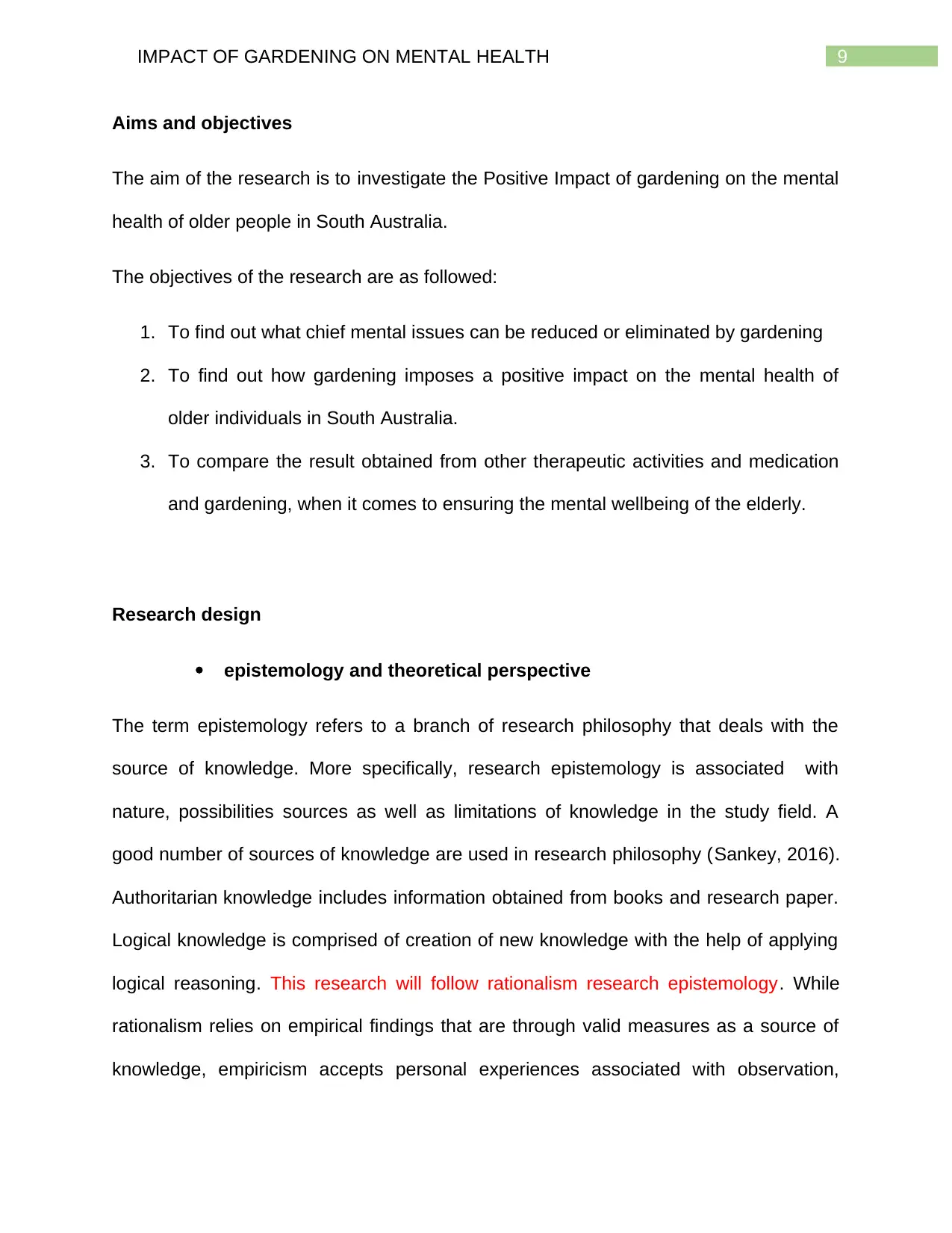
9IMPACT OF GARDENING ON MENTAL HEALTH
Aims and objectives
The aim of the research is to investigate the Positive Impact of gardening on the mental
health of older people in South Australia.
The objectives of the research are as followed:
1. To find out what chief mental issues can be reduced or eliminated by gardening
2. To find out how gardening imposes a positive impact on the mental health of
older individuals in South Australia.
3. To compare the result obtained from other therapeutic activities and medication
and gardening, when it comes to ensuring the mental wellbeing of the elderly.
Research design
epistemology and theoretical perspective
The term epistemology refers to a branch of research philosophy that deals with the
source of knowledge. More specifically, research epistemology is associated with
nature, possibilities sources as well as limitations of knowledge in the study field. A
good number of sources of knowledge are used in research philosophy (Sankey, 2016).
Authoritarian knowledge includes information obtained from books and research paper.
Logical knowledge is comprised of creation of new knowledge with the help of applying
logical reasoning. This research will follow rationalism research epistemology. While
rationalism relies on empirical findings that are through valid measures as a source of
knowledge, empiricism accepts personal experiences associated with observation,
Aims and objectives
The aim of the research is to investigate the Positive Impact of gardening on the mental
health of older people in South Australia.
The objectives of the research are as followed:
1. To find out what chief mental issues can be reduced or eliminated by gardening
2. To find out how gardening imposes a positive impact on the mental health of
older individuals in South Australia.
3. To compare the result obtained from other therapeutic activities and medication
and gardening, when it comes to ensuring the mental wellbeing of the elderly.
Research design
epistemology and theoretical perspective
The term epistemology refers to a branch of research philosophy that deals with the
source of knowledge. More specifically, research epistemology is associated with
nature, possibilities sources as well as limitations of knowledge in the study field. A
good number of sources of knowledge are used in research philosophy (Sankey, 2016).
Authoritarian knowledge includes information obtained from books and research paper.
Logical knowledge is comprised of creation of new knowledge with the help of applying
logical reasoning. This research will follow rationalism research epistemology. While
rationalism relies on empirical findings that are through valid measures as a source of
knowledge, empiricism accepts personal experiences associated with observation,
Paraphrase This Document
Need a fresh take? Get an instant paraphrase of this document with our AI Paraphraser
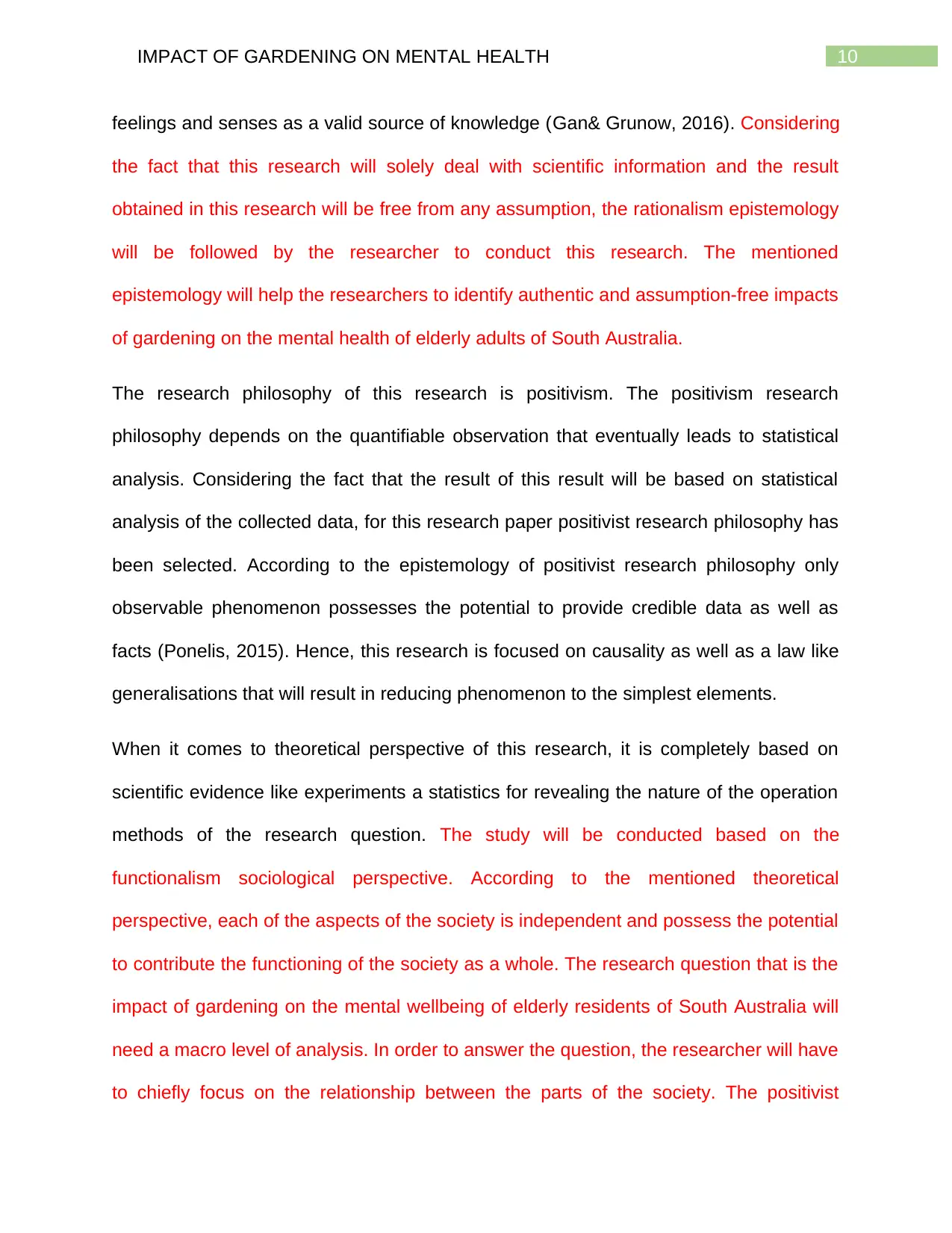
10IMPACT OF GARDENING ON MENTAL HEALTH
feelings and senses as a valid source of knowledge (Gan& Grunow, 2016). Considering
the fact that this research will solely deal with scientific information and the result
obtained in this research will be free from any assumption, the rationalism epistemology
will be followed by the researcher to conduct this research. The mentioned
epistemology will help the researchers to identify authentic and assumption-free impacts
of gardening on the mental health of elderly adults of South Australia.
The research philosophy of this research is positivism. The positivism research
philosophy depends on the quantifiable observation that eventually leads to statistical
analysis. Considering the fact that the result of this result will be based on statistical
analysis of the collected data, for this research paper positivist research philosophy has
been selected. According to the epistemology of positivist research philosophy only
observable phenomenon possesses the potential to provide credible data as well as
facts (Ponelis, 2015). Hence, this research is focused on causality as well as a law like
generalisations that will result in reducing phenomenon to the simplest elements.
When it comes to theoretical perspective of this research, it is completely based on
scientific evidence like experiments a statistics for revealing the nature of the operation
methods of the research question. The study will be conducted based on the
functionalism sociological perspective. According to the mentioned theoretical
perspective, each of the aspects of the society is independent and possess the potential
to contribute the functioning of the society as a whole. The research question that is the
impact of gardening on the mental wellbeing of elderly residents of South Australia will
need a macro level of analysis. In order to answer the question, the researcher will have
to chiefly focus on the relationship between the parts of the society. The positivist
feelings and senses as a valid source of knowledge (Gan& Grunow, 2016). Considering
the fact that this research will solely deal with scientific information and the result
obtained in this research will be free from any assumption, the rationalism epistemology
will be followed by the researcher to conduct this research. The mentioned
epistemology will help the researchers to identify authentic and assumption-free impacts
of gardening on the mental health of elderly adults of South Australia.
The research philosophy of this research is positivism. The positivism research
philosophy depends on the quantifiable observation that eventually leads to statistical
analysis. Considering the fact that the result of this result will be based on statistical
analysis of the collected data, for this research paper positivist research philosophy has
been selected. According to the epistemology of positivist research philosophy only
observable phenomenon possesses the potential to provide credible data as well as
facts (Ponelis, 2015). Hence, this research is focused on causality as well as a law like
generalisations that will result in reducing phenomenon to the simplest elements.
When it comes to theoretical perspective of this research, it is completely based on
scientific evidence like experiments a statistics for revealing the nature of the operation
methods of the research question. The study will be conducted based on the
functionalism sociological perspective. According to the mentioned theoretical
perspective, each of the aspects of the society is independent and possess the potential
to contribute the functioning of the society as a whole. The research question that is the
impact of gardening on the mental wellbeing of elderly residents of South Australia will
need a macro level of analysis. In order to answer the question, the researcher will have
to chiefly focus on the relationship between the parts of the society. The positivist
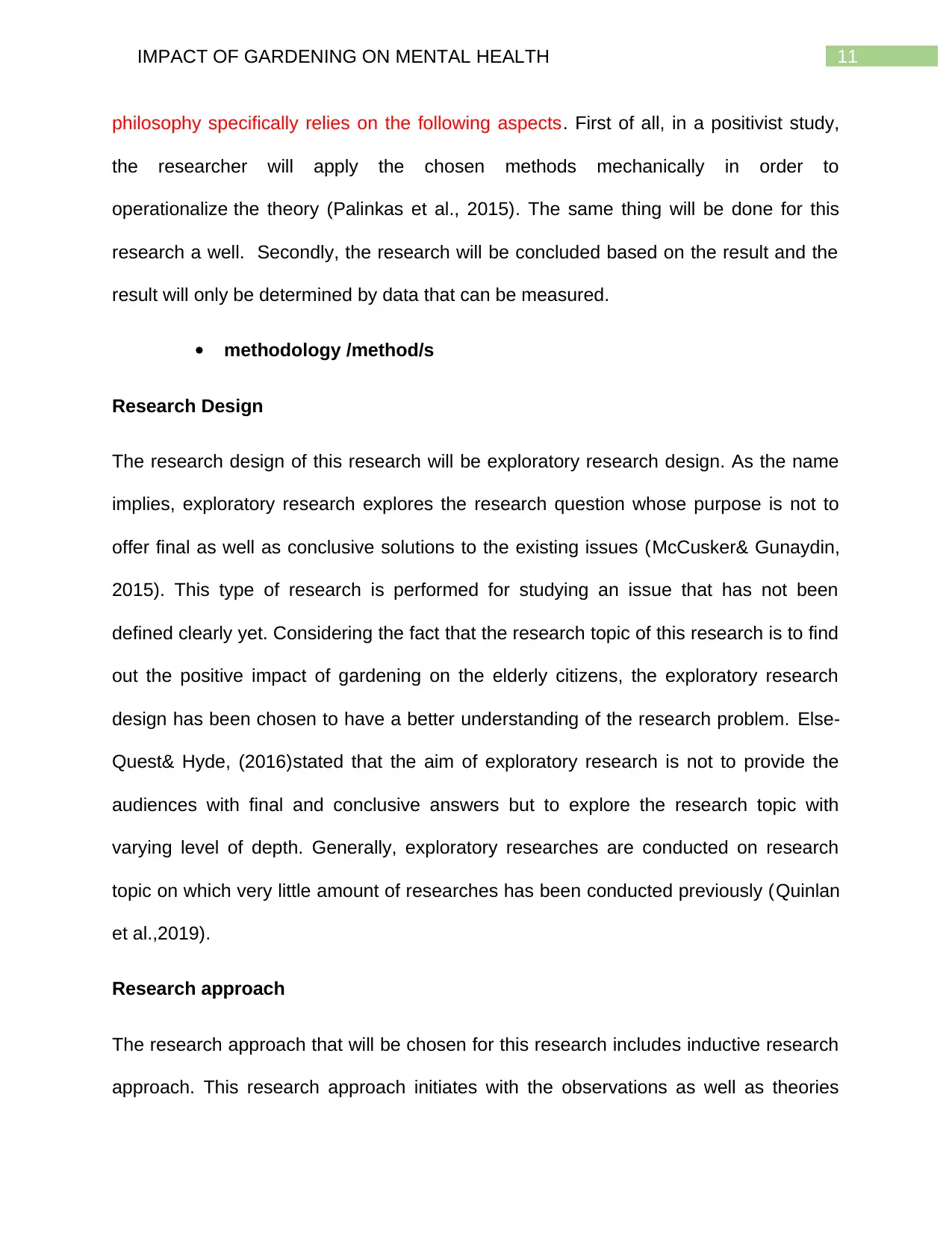
11IMPACT OF GARDENING ON MENTAL HEALTH
philosophy specifically relies on the following aspects. First of all, in a positivist study,
the researcher will apply the chosen methods mechanically in order to
operationalize the theory (Palinkas et al., 2015). The same thing will be done for this
research a well. Secondly, the research will be concluded based on the result and the
result will only be determined by data that can be measured.
methodology /method/s
Research Design
The research design of this research will be exploratory research design. As the name
implies, exploratory research explores the research question whose purpose is not to
offer final as well as conclusive solutions to the existing issues (McCusker& Gunaydin,
2015). This type of research is performed for studying an issue that has not been
defined clearly yet. Considering the fact that the research topic of this research is to find
out the positive impact of gardening on the elderly citizens, the exploratory research
design has been chosen to have a better understanding of the research problem. Else-
Quest& Hyde, (2016)stated that the aim of exploratory research is not to provide the
audiences with final and conclusive answers but to explore the research topic with
varying level of depth. Generally, exploratory researches are conducted on research
topic on which very little amount of researches has been conducted previously (Quinlan
et al.,2019).
Research approach
The research approach that will be chosen for this research includes inductive research
approach. This research approach initiates with the observations as well as theories
philosophy specifically relies on the following aspects. First of all, in a positivist study,
the researcher will apply the chosen methods mechanically in order to
operationalize the theory (Palinkas et al., 2015). The same thing will be done for this
research a well. Secondly, the research will be concluded based on the result and the
result will only be determined by data that can be measured.
methodology /method/s
Research Design
The research design of this research will be exploratory research design. As the name
implies, exploratory research explores the research question whose purpose is not to
offer final as well as conclusive solutions to the existing issues (McCusker& Gunaydin,
2015). This type of research is performed for studying an issue that has not been
defined clearly yet. Considering the fact that the research topic of this research is to find
out the positive impact of gardening on the elderly citizens, the exploratory research
design has been chosen to have a better understanding of the research problem. Else-
Quest& Hyde, (2016)stated that the aim of exploratory research is not to provide the
audiences with final and conclusive answers but to explore the research topic with
varying level of depth. Generally, exploratory researches are conducted on research
topic on which very little amount of researches has been conducted previously (Quinlan
et al.,2019).
Research approach
The research approach that will be chosen for this research includes inductive research
approach. This research approach initiates with the observations as well as theories
⊘ This is a preview!⊘
Do you want full access?
Subscribe today to unlock all pages.

Trusted by 1+ million students worldwide
1 out of 29
Related Documents
Your All-in-One AI-Powered Toolkit for Academic Success.
+13062052269
info@desklib.com
Available 24*7 on WhatsApp / Email
![[object Object]](/_next/static/media/star-bottom.7253800d.svg)
Unlock your academic potential
Copyright © 2020–2026 A2Z Services. All Rights Reserved. Developed and managed by ZUCOL.





